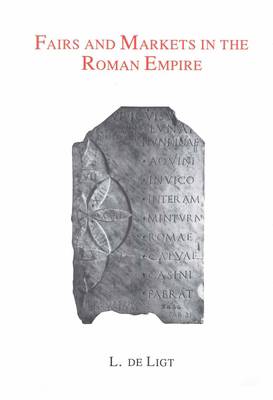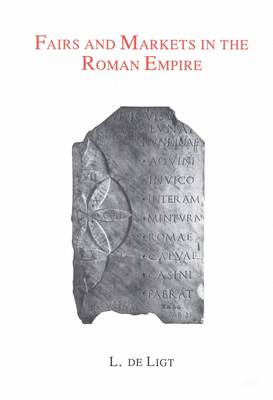
- Afhalen na 1 uur in een winkel met voorraad
- Gratis thuislevering in België vanaf € 30
- Ruim aanbod met 7 miljoen producten
- Afhalen na 1 uur in een winkel met voorraad
- Gratis thuislevering in België vanaf € 30
- Ruim aanbod met 7 miljoen producten
Zoeken
Fairs and Markets in the Roman Empire
Economic and Social Aspects of Periodic Trade in a Pre-Industrial Society
Luuk de Ligt
€ 177,45
+ 354 punten
Omschrijving
Periodic markets are institutions of crucial importance in all pre-industrial economies. Yet the subject has been given little atten-tion by Roman historians. The aim of this book is to remedy this state of affairs through an empire-wide study of annual, bi-annual, monthly and 'weekly' markets. The method used involves the interpretation of the ancient evidence in terms of economic and anthropo-logical theory and against the background of comparative data. Dr de Ligt starts by demonstrat-ing the continued importance of local and regional fairs throughout the im-perial period. Special attention is devoted to the role of both annual fairs and high-frequency periodic markets in the rural economy. In the second half of the book the scope of the discussion is extended to social and political aspects. Finally, the book addresses such topics as urban resistance towards neighbouring rural markets and the widespread practice of waiving customs duties for the duration of largescale religious festivals.
Specificaties
Betrokkenen
- Auteur(s):
- Uitgeverij:
Inhoud
- Aantal bladzijden:
- 328
- Taal:
- Engels
- Reeks:
- Reeksnummer:
- nr. 11
Eigenschappen
- Productcode (EAN):
- 9789050631464
- Verschijningsdatum:
- 1/01/1993
- Uitvoering:
- Hardcover
- Formaat:
- Genaaid
- Afmetingen:
- 168 mm x 241 mm
- Gewicht:
- 793 g

Alleen bij Standaard Boekhandel
+ 354 punten op je klantenkaart van Standaard Boekhandel
Beoordelingen
We publiceren alleen reviews die voldoen aan de voorwaarden voor reviews. Bekijk onze voorwaarden voor reviews.








